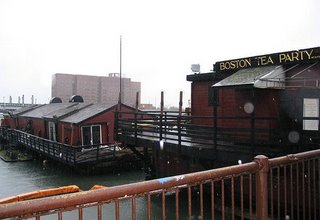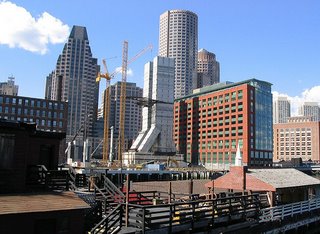 I'd like to share a little history about the Boston Tea Party. In 1773, Britain's East India Company was sitting on large stocks of tea that it could not sell in England. It was on the verge of bankruptcy. In an effort to save it, the government passed the Tea Act of 1773, which gave the company the right to export its merchandise directly to the colonies without paying any of the regular taxes that were imposed on the colonial merchants, who had traditionally served as the middlemen in such transactions. With these privileges, the company could undersell American merchants and monopolize the colonial tea trade. The act proved inflammatory for several reasons. First, it angered influential colonial merchants, who feared being replaced and bankrupted by a powerful monopoly. The East India Company's decision to grant franchises to certain American merchants for the sale of their tea created further resentments among those excluded from this lucrative trade. More important, however, the Tea Act revived American passions about the issue of taxation without representation. The law provided no new tax on tea.The colonists responded by boycotting tea. Unlike earlier protests, this boycott mobilized large segments of the population. It also helped link the colonies together in a common experience of mass popular protest. Particularly important to the movement were the activities of colonial women, who were one of the principal consumers of tea and now became the leaders of the effort to the boycott.
I'd like to share a little history about the Boston Tea Party. In 1773, Britain's East India Company was sitting on large stocks of tea that it could not sell in England. It was on the verge of bankruptcy. In an effort to save it, the government passed the Tea Act of 1773, which gave the company the right to export its merchandise directly to the colonies without paying any of the regular taxes that were imposed on the colonial merchants, who had traditionally served as the middlemen in such transactions. With these privileges, the company could undersell American merchants and monopolize the colonial tea trade. The act proved inflammatory for several reasons. First, it angered influential colonial merchants, who feared being replaced and bankrupted by a powerful monopoly. The East India Company's decision to grant franchises to certain American merchants for the sale of their tea created further resentments among those excluded from this lucrative trade. More important, however, the Tea Act revived American passions about the issue of taxation without representation. The law provided no new tax on tea.The colonists responded by boycotting tea. Unlike earlier protests, this boycott mobilized large segments of the population. It also helped link the colonies together in a common experience of mass popular protest. Particularly important to the movement were the activities of colonial women, who were one of the principal consumers of tea and now became the leaders of the effort to the boycott.
 In ports other than Boston, agents of the company were persuaded to resign, and new shipments of tea were either returned to England or warehoused. In Boston, the agents refused to resign and, with the support of the royal governor, preparations were made to land incoming cargoes regardless of opposition. On the evening of December 16, 1773, three companies of fifty men each, masquerading as Mohawk Indians, passed through a tremendous crowd of spectators, went aboard the three ships, broke open the tea chests, and heaved them into the harbor.As the electrifying news of the Boston "tea party" spread, other seaports followed the example and staged similar acts of resistance of their own.
In ports other than Boston, agents of the company were persuaded to resign, and new shipments of tea were either returned to England or warehoused. In Boston, the agents refused to resign and, with the support of the royal governor, preparations were made to land incoming cargoes regardless of opposition. On the evening of December 16, 1773, three companies of fifty men each, masquerading as Mohawk Indians, passed through a tremendous crowd of spectators, went aboard the three ships, broke open the tea chests, and heaved them into the harbor.As the electrifying news of the Boston "tea party" spread, other seaports followed the example and staged similar acts of resistance of their own.
When the Bostonians refused to pay for the property they had destroyed, George III and Lord North decided on a policy of coercion, to be applied only against Massachusetts, the socalled Coercive Acts. In these four acts of 1774, Parliament closed the port of Boston, drastically reduced the powers of selfgovernment in the colony, permitted royal officers to be tried in other colonies or in England when accused of crimes, and provided for the quartering of troops in the colonists' barns and empty houses.

4 comments:
Good brush up on my history, been a long time since I was in school, *grin*, thanks for stopping by my blog Bill!
Interesting blog! Good work!
Hello Bill,
Thank you for visting my blog!
Have a nice day!
Nice blog. I am a tea aficionado as well. I like the Ceylon blend by Davison, Newman & Co, appartenly the same one used in the boston tea party.
Post a Comment